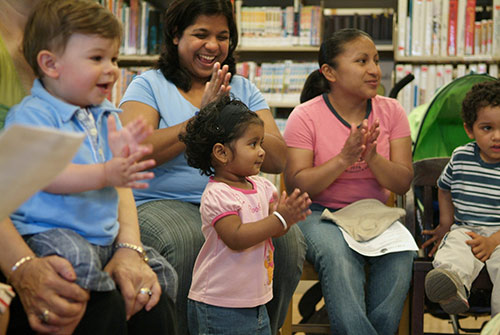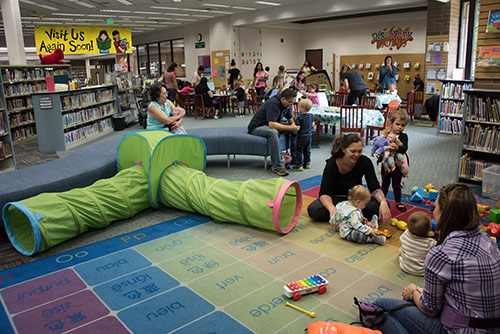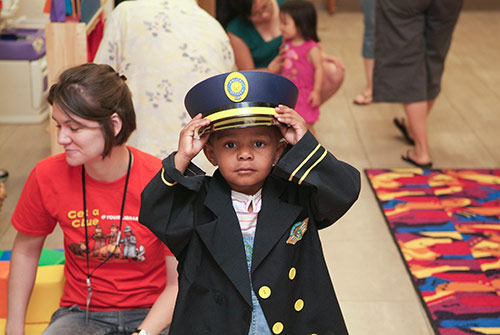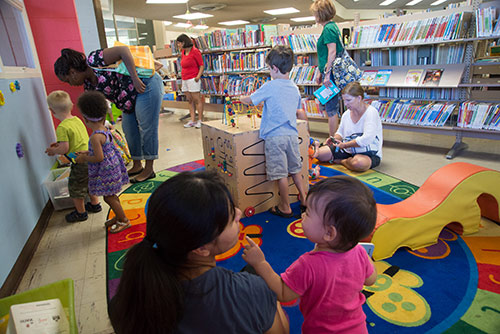Stay & Play Toolkit

What is Stay & Play
Stay & Play is a program specifically designed to serve and support the needs of informal child care providers, often referred to as Family, Friend, and Neighbor or FFNs. Stay & Play is designed to be offered over time and includes weekly in-person gatherings as well as targeted online resources. Learn how to implement Stay & Play.
Purpose of this Toolkit
This toolkit highlights the best practices and lessons learned from five public libraries in California that piloted Stay & Play. Five sections contain concrete steps, resources, and examples to assist other libraries in engaging and supporting the family, friend, and neighbor caregivers in their own communities.
Background
In 2016, the Oakland Public Library received a Packard Foundation grant to create programming specifically designed for family, friend and neighbor child care providers. The resulting Oakland Play Café then led to the subsequent pilot grant which tested this service model in other, diverse library settings throughout California. “Stay & Play” was the name given to the piloted service model that resulted.
Stay & Play builds on the early learning foundations and best practices promoted, for more than a decade, by the California State Library’s Early Learning with Families (ELF) initiative — a statewide initiative that supports the continued evolution of library services to young children, their families and caregivers.

The Five Components of Stay & Play
Stay & Play is both a weekly in-person program series as well as targeted FFN resource. Five core components inform all aspects of Stay & Play. These five components are listed below and further explained in Implementing Stay & Play.
- Outreach: Targeted and focused outreach to family, friend, and neighbor child care providers
- Play: Meaningful play opportunities that are child-directed and encourage caregiver and child interactions
- Story Time: Library story times specifically designed for informal child care providers and the children in their care
- Resources: Programming, resource materials, and/or community experts to better equip informal child care providers with child development, safety, and early learning information
- Food: Provision of food or opportunities to accommodate the food needs of children and their caregivers

Implementing Stay & Play
- Early Learning Approach: Learn about the underlying principles of Stay & Play.
- Community and Library Assessment: Use these tools to strategically get to know FFNs in your community and determine your library’s capacity.
- Design and Outreach: Implement the logic model to intentionally design your Stay & Play services.
- Program Delivery: Explore the nuts and bolts of creating your space and then running an in-person Stay & Play program series.
- Evaluation and Continuous Improvement: Discover practical tools to plan your evaluation strategy to support your program design, and to complete the evaluation effectively.

Stories from the Pilot
Evaluation
The five Stay & Play pilot libraries were:
- Fresno County Public Library, Mendota
- Nevada County Library, Grass Valley
- San Jose Public Library, Educational Park
- Santa Barbara Public Library, Eastside
- Tulare County Library, Pixley
All five libraries participated in a formal evaluation of their Stay & Play services. Two of the key findings were: it was important to allocate sufficient and dedicated staff time to plan and create the Stay & Play services, and developing trusting relationships between caregivers and library staff was essential. See the full evaluation report.
Case Studies
Case studies from two of the five pilot libraries and an archived statewide webinar highlight how this service model can be adapted to meet the unique needs of different libraries and the Family, Friend and Neighbor child care providers in their communities:
- Case Study: Eastside, Santa Barbara Public Library
- Case Study: Grass Valley, Nevada County Library
- Webinar: Stay & Play: A new way to engage family, friends and neighbors who care for young children
Acknowledgments
This project was made possible with funding from the David and Lucile Packard Foundation. This project was supported in part by the U.S. Institute of Museum and Library Services under the provisions of the Library Services and Technology Act, administered in California by the State Librarian.
Thank you to Julie Weatherston, Early Childhood Development Specialist, for work on creating this toolkit, and to Engage R&D for conducting the project evaluation.
In addition, the following organizations and individuals gave their considerable expertise, time and energy to make this project and resulting toolkit possible:
The five pilot libraries and their respective staff teams:
- Fresno County Public Library (Mendota Branch)
- Nevada County Library (Grass Valley Branch)
- San Jose Public Library (Educational Park Branch)
- Santa Barbara Public Library (Eastside Branch)
- Tulare County Library (Pixley Branch)
Advisory Committee Members
Carolyn Brooks, El Dorado County Library; Barbara Bruxvoort, San Bruno Public Library; Suzanne Flint, Child Development Specialist; Kathi Guerrero, El Dorado County First 5; Margaret Jerene, Alameda County First 5; Nina Lindsay, Oakland Public Library; and Lisa Regalla, Bay Area Discovery Museum
Questions?
All photos courtesy of the Early Learning with Families (ELF) initiative
